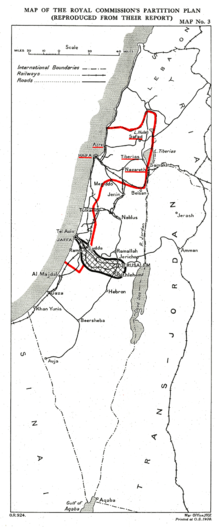Peel Plan
| Report of the Palestine Royal Commission | |
|---|---|

Peel Commission Partition Plan, July 1937
|
|
| Created | July 1937 |
| Ratified | 7 July 1937 |
| Purpose | Investigation of the causes of the 1936 Arab revolt in Palestine |
The Peel Commission, formally known as the Palestine Royal Commission, was a British Royal Commission of Inquiry, headed by Lord Peel, appointed in 1936 to investigate the causes of unrest in Mandatory Palestine, which was administered by Britain, following the six-month-long Arab general strike in Mandatory Palestine.
On July 7, 1937, the commission published a report that, for the first time, stated that the League of Nations Mandate had become unworkable and recommended partition. The British cabinet endorsed the Partition plan in principle, but requested more information. Following the publication, in 1938 the Woodhead Commission was appointed to examine it in detail and recommend an actual partition plan.
The Arabs opposed the partition plan and condemned it unanimously. The Arab High Committee opposed the idea of a Jewish state and called for an independent state of Palestine, "with protection of all legitimate Jewish and other minority rights and safeguarding of reasonable British interests". They also demanded cessation of all Jewish immigration and land purchase. They argued that the creation of a Jewish state and lack of independent Palestine was a betrayal of the word given by Britain.
The Zionist leadership was bitterly divided over the plan. In a resolution adopted at the 1937 Zionist Congress, the delegates rejected the specific partition plan. Yet the principle of partition is generally thought to have been "accepted" or "not rejected outright" by any major faction: the delegates empowered the leadership to pursue future negotiations. The Jewish Agency Council later attached a request that a conference be convened to explore a peaceful settlement in terms of an undivided Palestine. According to Benny Morris, Ben-Gurion and Weizmann saw it 'as a stepping stone to some further expansion and the eventual takeover of the whole of Palestine.’
The Commission was established at a time of increased violence; serious clashes between Arabs and Jews broke out in 1936 and were to last three years. On 11 November 1936, the commission arrived in Palestine to investigate the reasons behind the uprising. The Commission was charged with determining the cause of the riots, and judging the grievances of both sides. Chaim Weizmann made a speech on behalf of the Jews. On 25 November 1936, testifying before the Peel Commission, Weizmann said that there are in Europe 6,000,000 Jews ... "for whom the world is divided into places where they cannot live and places where they cannot enter."
...
Wikipedia
